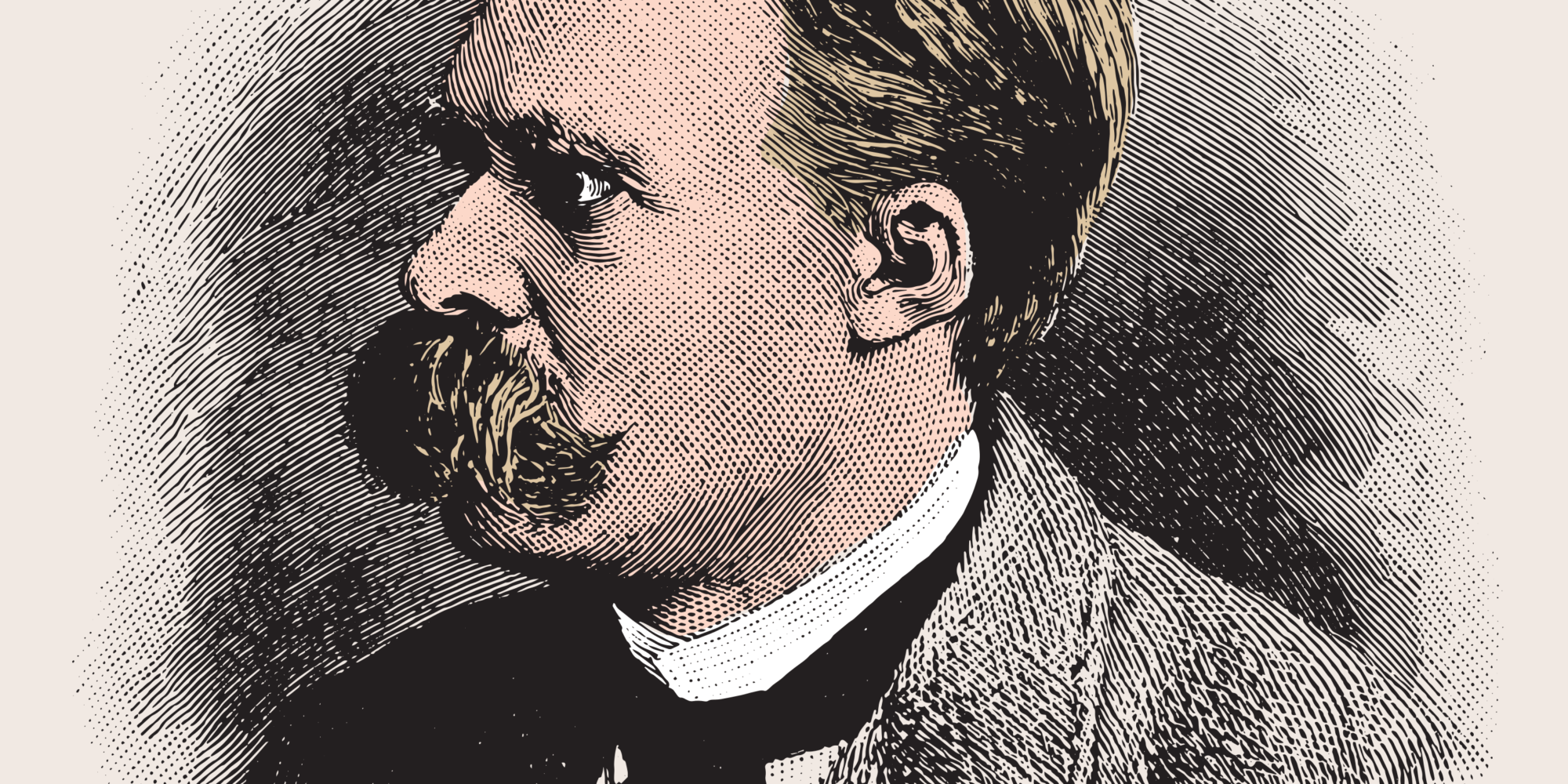Why did Nietzsche break with Schopenhauer’s Idealism?
Reading | Metaphysics
![]() A. A. Adedire, BSc, BA | 2024-09-29
A. A. Adedire, BSc, BA | 2024-09-29

Once an enthusiastic Idealist in the tradition of Arthur Schopenhauer, the later Friedrich Nietzsche broke from Schopenhauer’s philosophy with a vengeance. Adebambo Adedire argues that this shift had more to do with Nietzsche’s later rejection of the metaphysical project itself, than with the particulars of Schopenhauer’s Idealism. For Nietzsche was to eventually consider the goal of understanding the nature of reality both impossible and inherently demeaning to the human condition. Yet, we ask, can a thinking human being ever stop wondering about what reality, and the self within it, ultimately are? Even if we, as primates, cannot arrive at the ultimate metaphysical answers, aren’t we correct in aspiring to overcome our own metaphysical mistakes and delusions?
Friedrich Wilhelm Nietzsche was one of the greatest philosophical minds of the 19th century. A controversial figure in the history of philosophy, one of his chief assets was his ability to deeply penetrate philosophical concepts and question their foundation in a way that was most ingenious and beautifully poetic. Indeed, Nietzsche is often overlooked for his polemical wit and remembered instead for his prescriptive philosophical ideas.
Central to Nietzsche’s development was Arthur Schopenhauer’s idealism, proposed in his magnum opus The World as Will and Representation. Nietzsche’s relationship with the work of Arthur Schopenhauer is storied and complicated. Naturally, Schopenhauer too was not exempt from the polemical fastidiousness of Nietzsche’s pen. Labeled a pessimist, Schopenhauer set forth a metaphysical system to define reality as a singular unified whole. He began his inquiry into understanding reality through the lens of Kantian epistemology. In his interpretation of Kantian concepts, he believed that space, time and causality were necessary features of the mind’s organizing structure. Moreover, these features of the mind were not reality at base. In a word, the viewer and the view are fundamentally inseparable. Behind the façade of the view was the thing-in-itself, a non-rational and aimless striving, which Schopenhauer termed “will.” Influenced by these ontological claims, Nietzsche spoke on his admiration for Schopenhauer by proclaiming
I belong to those readers of Schopenhauer who know perfectly well, after they have turned the first page, that they will read all the others, and listen to every word that he has spoken. My trust in him sprang to life at once and has been the same for nine years. I understood him as though he had written for me. [1]
Despite the abundant praise in his early period, Nietzsche later significantly departed from Schopenhauer’s metaphysics. Why was that so? What were Nietzsche’s criticisms of Schopenhauer’s idealism?
Following in the tradition of German idealists before him, Schopenhauer envisioned a grand, all-encompassing system for understanding reality, a system to communicate a singular idea across multiple domains. Schopenhauer began philosophizing with the most fundamental epistemic question: How can one come to know the world? Acknowledging his own influence, he turned to Immanuel Kant’s transcendental idealism as a starting point. Kant contended that the things experienced out in the world, space, time and even causality, are ways of knowing dependent on and shaped by human perception. Objects in the world appear to us in certain ways, but their true nature, independent of human perception, is unknowable. This is a core distinction in Kantian idealism: there are the things in the world of human experience shaped by human perception, and there are things-in-themselves independent of human perception. We can only cognize how the world appears to be. We cannot cognize things-in-themselves.
In 1813, a young Arthur Schopenhauer completed a dissertation on the principle of sufficient reason, a philosophical idea on causation. He was awarded his doctorate in absentia, having abandoned his earlier scientific studies in favor of philosophy. He believed his ideas to be a further elaboration of Kantian idealism but also entirely original in urgency and observation. Schopenhauer saw the Kantian distinction between how the world appears to be and the things-in-themselves somewhat differently. He believed that space, time and causality were indeed features of the mind’s organizing structure; but it then follows that there is no casual relationship between the objects of human perception and those objects independent of human perception. As such, there is only one reality viewed from two perspectives. Similarly, one would not say that the head of a cat causes its tail. These are simply two views of a greater whole, namely the cat. There cannot be a causal relationship between objects as they appear and objects as they are, independent of perception, because causality itself is an organizing principle of the mind. The importance of Schopenhauer’s perspectival claim of reality cannot be understated, because he believed it provided much needed clarity to Kant’s epistemology.
If we cannot look outward at the world to understand its fundamental nature, as Schopenhauer claims, then where must we look? His answer: inwardly. Schopenhauer believed that the foundation of reality could be intuited introspectively, similar to the views in Eastern religious and philosophical traditions. He further elaborated that, once we look inwardly, we find an instinctive, non-rational urge of unsated wanting. Consequently, this unsated urge produces an existence of unremitting discontentment. Here “non-rational” is a more precise term than “irrational,” as the latter would mean counter to reason. The philosopher, however, means something more subtle, which is “not originating from the faculty of reason.”
Schopenhauer believed that the instinctive desires of the “will” can be intuited within the body as a “will to live.” To him, the thing-in-itself is the will to live, and the world, dependent on human perception, is a set of representations of this inner striving that underlies the external world as much as it underlies the body. These representations are mind-dependent appearances so, appropriately, Schopenhauer calls them “ideas” or plainly “representations.” Again, this philosophical system claims that reality is a unified whole and these two epistemic terms, “will” and “idea,” are simply complementary perspectives or dual aspects.
To understand the late period of Friedrich Nietzsche, it is sometimes appropriate or even necessary to see his philosophical ideas as a response to or a criticism of most philosophy prior to his thinking. Nietzsche’s early work was an exploration of influences mixed with a smattering of polemical insights. With the maturation of his philosophical diet, however, came a marked shift: the development of a philosophy attuned to the cultural- and psychological-sense. In this I mean, Nietzsche’s late period work began to shift to key polemical questions in his examination of philosophical ideas: What does this espoused idea communicate about the espouser? And how would or did this espoused idea influence culture at large? Thus, Nietzsche’s famous declaration of the death of God was not just an atheistic pronouncement but a pronouncement of the death of a moral foundation within culture at large. He viewed Western culture, sometimes more specifically German culture, as progressing towards self-annihilation through a leveling of the individual spirit. He saw society as experiencing a decline in creativity, morality and vitality. Nietzsche perceived his mission as a concerted effort to reclaim the principles of self-definition in the face of cultural decadence. He viewed himself as trying to rescue Greco-Roman naturalism more generally.
Within the historical tradition of philosophy, and even more so in religious traditions, Nietzsche saw a trend in dividing the foundation of reality: there was the world of appearances, the “representations” or the “phenomena,” and there was the world underlying the appearances, the “thing-in-itself” or the “will.” Nietzsche believed that when this halving of reality took root in a philosophy, it then followed that these underlying aspects of the real were seen as “more real,” “more truthful,” or “purer.” These philosophies denied appearances in favor of an imagined world beyond understanding. For Nietzsche, this ontological move was parasitically conjoined with pessimism. In tracing the genealogy of this halving of reality, he concluded that, with the rejection of appearances, followed the denial of life itself. And the counterbalance of this negation was the affirmation of every aspect of life and the creation of one’s own values. He endeavored to bring humans back to themselves and ultimately empower and elevate the individual as a quantum that cannot be subsumed within any system. These proto-existentialist ideas were in stark contrasts to the German idealists before him, who proposed grand sweeping systems to collate nature into a singular understanding. Nietzsche believed that the pessimism of Schopenhauer followed from his halving ontology, which was a Platonic or a Christian impulse—the deadliest of Nietzschean sins next to pity. Even further, Nietzsche saw the idealism of Schopenhauer as an all-too-human framework imposed on reality, a metaphysical fiction divorced from lived experience, an invented truth.
For Arthur Schopenhauer, the great task of philosophy was to uncover the true nature of the world. He supposed that, for the ordinary man, reality was mundane and obvious, in contrast to the philosopher who, having found wonderment in the mundane, is tasked with piercing through appearances to discern the fundament of reality. It is sometimes said of Friedrich Nietzsche that he espouses a philosophy of the elite, but in his judgment of this claim by Schopenhauer he breaks from this characterization. Nietzsche rightfully questioned this “sacrosanct” task of the philosopher. He questioned the very project of metaphysics. What is the psychological lineage of an idea? What is the ultimate price for letting an ontology pervade the cultural milieu? And are we not too human to uncover a “true world”? Nietzsche’s gift was that he asked.
Bibliography
1. Nietzsche, Friedrich. Nietzsche: Untimely Meditations. Cambridge, England: Cambridge University Press, 1997.

Essentia Foundation communicates, in an accessible but rigorous manner, the latest results in science and philosophy that point to the mental nature of reality. We are committed to strict, academic-level curation of the material we publish.
Recently published
Reading
Essays
Seeing
Videos
Let us build the future of our culture together
Essentia Foundation is a registered non-profit committed to making its content as accessible as possible. Therefore, we depend on contributions from people like you to continue to do our work. There are many ways to contribute.















